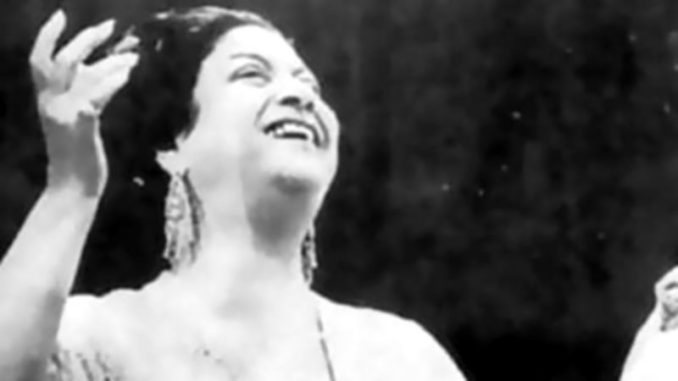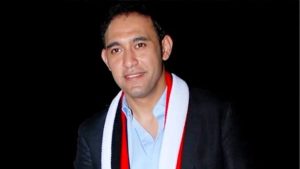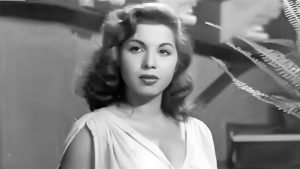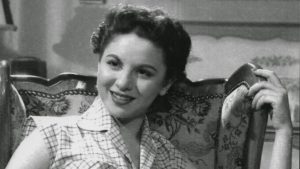
Umm Kulthum, an Egyptian singer (December 31, 1898 – February 3, 1975).
Biography and life story of celebrity in English.
Basic info wiki card
English name: Umm Kulthum
Arabic name: أم كلثوم
Full real name: Fatma Ibrahim El-Beltagy
Nickname: Kawkab Al-Sharq, Lady of Arabic Singing
Nationality: Egypt
Language: Arabic, Egyptian dialect
Religion: Islam
Date of birth: December 31, 1898
Place of birth: Dakahlia, Egypt
Date of death: February 3, 1975
Place of death: Cairo, Egypt
Age: 76 years, 3 months, 0 days (at death in 1975)
Zodiac sign: Capricorn
Profession: Singer, Actress
Genre: Arabic Music
Years active: 1935 – 1948
Marital status: Married, Deceased
Husband: Hassan El-Hafnawi
Biography, Life story
Umm Kulthum was born on December 31, 1898, in Dakahlia, Egypt. She became famous in Egypt and throughout the Arab world in the 20th century, earning the titles Kawkab Al-Sharq and Lady of Arabic Singing. Her father, Ibrahim El-Beltagy, was the muezzin of a village in the Sinbelaween district. She memorized and sang poems and chants alongside her brother Khaled. By around the age of ten, she was performing in front of an audience in her village.
Umm Kulthum’s fame began to grow from a young age, becoming the primary source of income for her family. In 1916, she went with her father to Cairo to take her first steps in her artistic career, performing on the night of Isra and Mi’raj at the palace of Azuddin Yakan Pasha, where she received a gold ring from the lady of the palace and earned 3 pounds.
In 1921, she returned to Cairo to settle permanently. By 1923, she was performing at the events of the elite, including a concert attended by the leading female singers of her time, such as Mounira El-Mahdeya, who was known as the Sultaness of Tarab. In 1924, she met Ahmad Rami, who had just returned from Europe, at one of her performances. That year, Mohamed El-Qasabji began to prepare Umm Kulthum artistically and spiritually, forming her own orchestra. Nearly a year later, after the death of Sheikh Abu El-Ala Mohamed, who had a profound spiritual influence on her and was her guide in the world of music, Umm Kulthum shed her traditional attire and appeared in the garb of Egyptian maidens.
In 1928, her star rose when she sang the monologue “If I Forgive and Forget the Pain,” achieving record sales and solidifying her name in the musical scene. This was the same year she composed the song “On My Eyes the Parting” for herself. In 1935, she performed “Ali Balad Al-Mahboub Wadini,” composed by the young musician Riyad El-Sunbati, who would continue to compose for her for nearly 40 years, being her primary composer during the 1950s. The following year, she composed the song “I Wish I Were the Breeze,” marking her second and last composing experience after “On My Eyes the Parting” in 1928.
In 1946, she sang three poems composed by El-Sunbati with words by Ahmad Shawqi, namely “Salu Qalbi” and “Walad Al-Huda,” and one of her most beautiful pieces in praise of the Prophet, “Nahj Al-Burda.”
In 1966, she sang El-Sunbati’s composition “Al-Attlal” with lyrics by the poet Ibrahim Nagy, a performance that came just one year after her famous song “Enta Omri” composed by Mohamed Abdel Wahab, showcasing El-Sunbati’s exceptional ability to compose classical Arabic poetry.
The revolution that swept Egypt dealt harshly with everything related to the former king’s era, leading to the ban of Umm Kulthum’s songs from the radio and her expulsion from the position of (Union of Musicians) as she was deemed (the singer of the old regime). This decision was not from the Revolutionary Command Council but was taken individually by the officer overseeing the radio.
Although Umm Kulthum sang for the besieged army in the Faluja during the Palestinian War with the song “Ghalabat Asalih Fi Rouhi,” which included members like Abdel Nasser and Anwar Sadat, she was regarded as being against the revolution due to her receiving a medal from the king and singing for him on multiple occasions, including a song in 1932 in the presence of King Fouad.
Umm Kulthum announced her decision to retire, which reached Gamal Abdel Nasser himself, who then canceled the ban. A delegation consisting of Abdel Nasser, Abdel Hakim Amer, and Salah Salem went to convince her to change her mind. This moment deeply affected her, leading her to admire Abdel Nasser, and she sang songs for him later. After the situation calmed down, everything that happened to Umm Kulthum was rectified, even leading her to chair the committee overseeing the selection of the new national anthem, where she supported the anthem prepared by Abdel Wahab. However, Dr. Hussein Fouzi proved that the anthem was copied from a recording by Czech musician Béla Bartók after several modifications.
In 1954, Umm Kulthum reduced her concert schedule due to health problems. Thyroid disease caused her eyes to bulge, prompting her to wear dark glasses regularly. This also led to the cessation of her acting career, which was limited to six films. In 1954, she married Hassan El-Hafnawi, one of her doctors who treated her, and the marriage lasted until her death. During the war with Israel in the 1950s, she sang several songs, including “Egypt in My Heart” and “Anthem of Departure,” and participated in the radio series “Rabia Al-Adawiya” with songs that were also featured in the famous film in which she played the lead role.
The 1950s ended with a strange incident in which Umm Kulthum’s dog bit a passerby, and the prosecution acquitted her, causing widespread controversy, especially among law professors who considered the decision a favoritism toward Umm Kulthum. This matter even reached the pages of Al-Ahram, the first official newspaper. Later, the sharp-tongued poet Ahmed Fouad Negm wrote the famous poem “Kalb Al-Sitt.” Umm Kulthum ended 1959 with her delicate song “Hajartak.”
In the 1960s, Umm Kulthum experienced the most glorious era of her artistic career, starting with her famous song “Enta Feen w Al-Hob Feen.” From this point on, Baligh Hamdi became one of her most important composers, writing at least one song for her each year. She ended 1961 with the song “Hawa Sahih Al-Hawa Ghalab.” The 1960s marked a turning point in Umm Kulthum’s life; despite her most famous songs being from this period, many believe it was one of her less productive times artistically, with a few exceptions. During this period and until her death, she became a sacred icon in the lives of Egyptians. In 1960, she received the First Class Merit Award, and in 1962, she sang “Ansak.” That same year, the U.S. Navy hospital prepared to receive Umm Kulthum for a periodic checkup (in recognition of her status in the Arab world). In 1964, she sang one of her most famous songs, “Enta Omri,” with maestro Mohamed Abdel Wahab, a collaboration that took 40 years to materialize and required the personal intervention of Abdel Nasser to come to fruition. During the Six-Day War, Umm Kulthum received the news of the June setback and the defeat of the Egyptian army with sadness, just like all Egyptians at that time. However, she was one of the first artists to hold many concerts inside and outside Egypt, donating the profits to the war effort and singing her famous song “Asbah ‘Indi Al-An Banduqiya,” as well as the song “Habib Al-Sha’ab” for Abdel Nasser after his resignation and return.
In 1967, Umm Kulthum performed at the “Olympia” theater in Paris, singing “Al-Attlal,” and amusingly, she fell from the stage while reciting the line: “Has love seen drunkards like us, how much we built of fantasies around us,” when a drunken Frenchman insisted on kissing her foot. The 1960s concluded with the death of Gamal Abdel Nasser in 1970 while she was singing at a concert in Russia. She returned to Egypt and sang “Message to the Leader,” written by Nizar Qabbani and composed by Riyad El-Sunbati, mourning Abdel Nasser after his death. After Anwar Sadat took over the presidency, Umm Kulthum maintained her status as the first singer and a close friend of Sadat.
Umm Kulthum passed away in 1975 in Cairo after a battle with kidney inflammation. It is worth noting that she never got to sing the song “Awkati Bi-Tahlu Ma’ak…. W Hayati Bi-Takmal Birid’ak,” as she fell ill during rehearsals. She traveled to London for treatment and passed away before she could perform it, with the song beginning with “Ya Lli Shababak Fi Junood Allah…. Wal-Harb Fi Qulubhum Siyam Wa Salat.”
List of Works
Films
Umm Kulthum participated in numerous musical and acting films from 1935 to 1948, starring in six films:
Wadad (1935), Nashid Al-Amal (1937), Dananeer (1939), Aida (1942), Salama (1944), Fatima (1948).
Visual Recordings
– Ghani Li Shway (Film Salama 1944).
– Enta Omri (Cairo concert 1964).
– Ba’id ‘Anak + Mawal (Cinema Qasr Al-Nil concert 1966).
– Fat Al-Mi’ad (Sudan concert 1968).












Leave a Reply